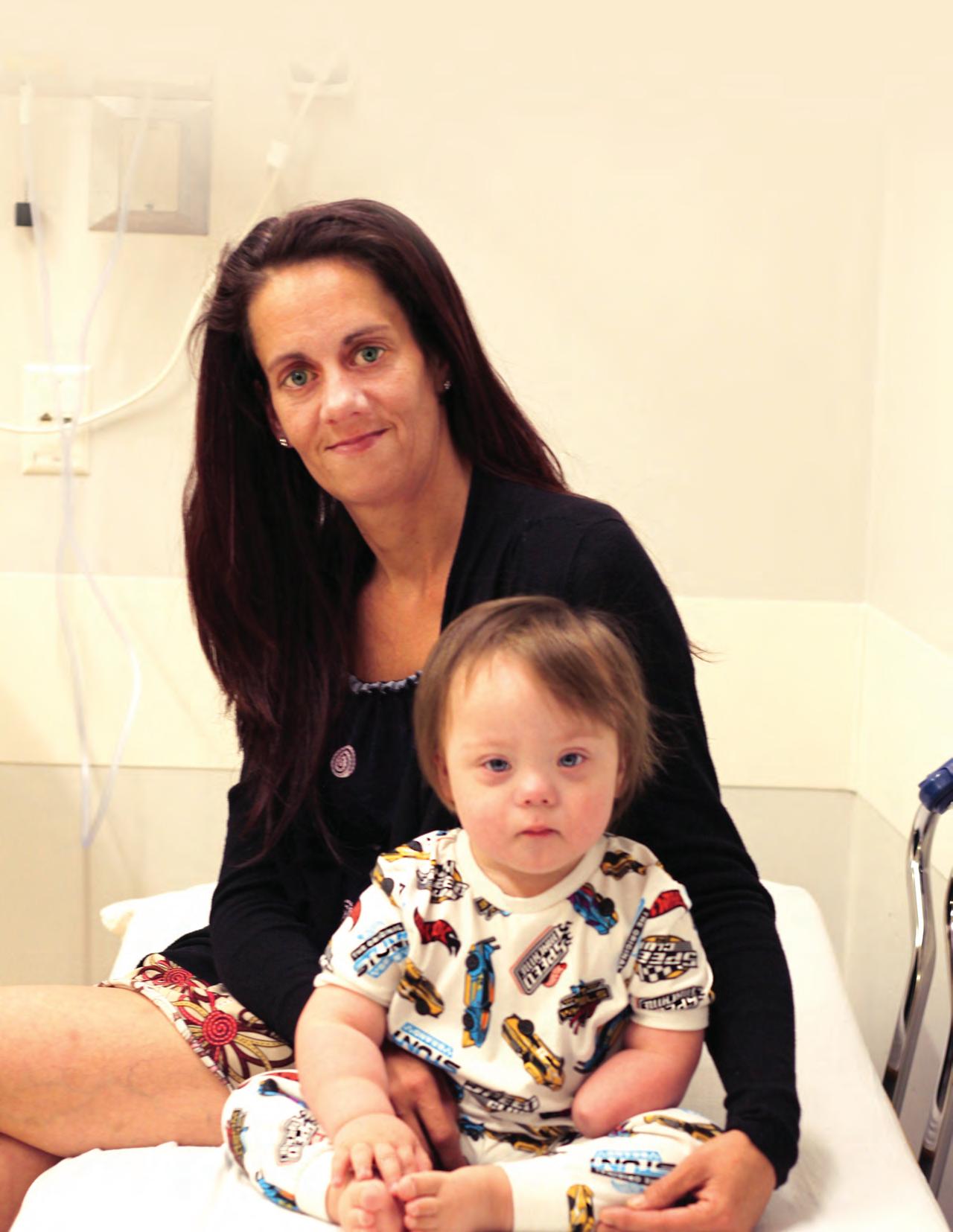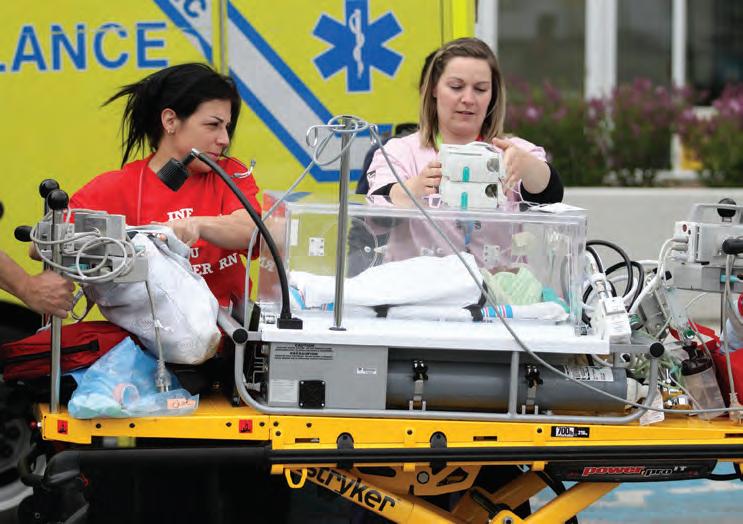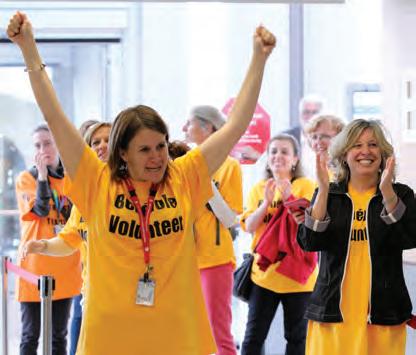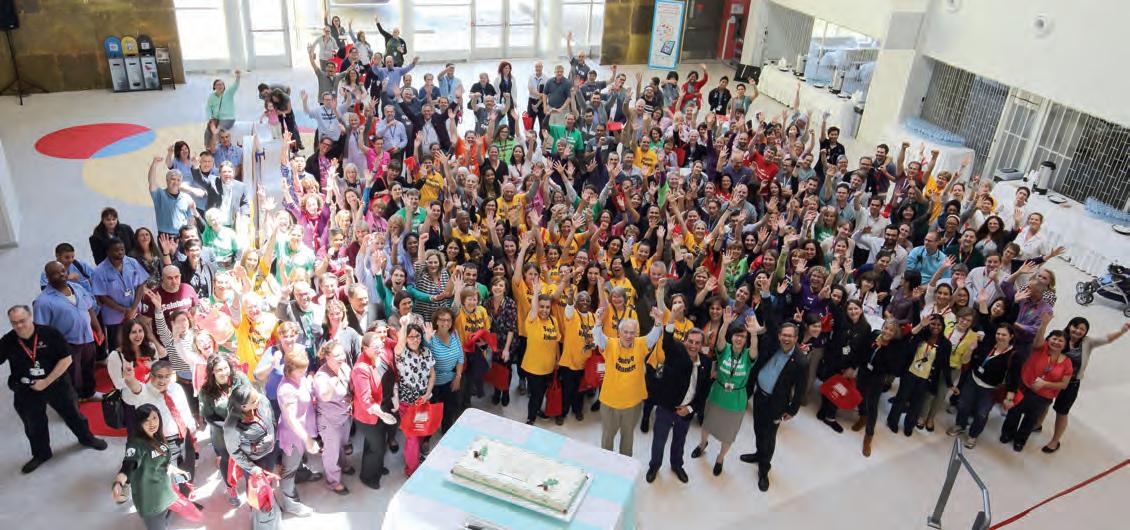Chez nous

ALSO IN THIS ISSUE:
Celebrating the 10th anniversary of the move to the Glen site! — page 6
Influenza: why vaccination is so important — page 9
An animated summer at the MCH — page 11
— page 3


ALSO IN THIS ISSUE:
Celebrating the 10th anniversary of the move to the Glen site! — page 6
Influenza: why vaccination is so important — page 9
An animated summer at the MCH — page 11
— page 3
Dear pediatric healthcare professionals,
As the summer months are coming to an end, we want to take a moment to acknowledge the important work happening across our hospital and healthcare network.
Recent findings from our iMatter survey reveal that some respondents have witnessed uncivil behaviour among colleagues and some also feel that our institution tolerates such conduct. These insights underscore the need for us to address civility within our environment.
Building upon Dr. Chris Turner’s impactful work, “Civility saves lives”, it is clear that fostering mutual respect and civility isn’t just about professionalism — it’s also about quality of care. Civility reduces errors, improves team communication and creates a safe atmosphere where our most vulnerable patients can receive the best possible care.
In response, we launched the “Civility saves lives” campaign, with a kickoff session featuring Dr. Turner himself. The session aimed to sensitize us all to the profound impact that civility — or the lack thereof — can have on patient outcomes and workplace safety. It was an opportunity to reflect on our own behaviours and commit to cultivating a respectful, supportive environment.
Together, let’s recognize that civility is a cornerstone of exceptional pediatric care and a shared responsibility. By actively promoting kindness, listening and constructive conflict resolution, we strengthen our teams and, most importantly, safeguard our patients’ well-being.
In parallel, our preparations continue for next year’s Accreditation Canada visit. Thank you for your ongoing dedication to aligning our practices to meet and exceed the required standards.
At the provincial level, Santé Québec has released its new strategic plan, offering a renewed vision for healthcare delivery. We are aligning our efforts with these objectives while actively developing the McGill University Health Centre’s (MUHC) own strategic orientation and updated clinical plan, ensuring our institution remains at the forefront of innovation and excellence in care.
We are also continuing our work as part of the provincewide budget optimization initiative. Every contribution counts as we strive to maintain high-quality services while using our resources more effectively.
Finally, we are pleased to share that the MUHC is moving forward with integrating MDClone, a data platform that will significantly improve our ability to access and use information in decision-making, quality improvement and research.
As always, we are deeply grateful for your hard work and commitment. We hope you all had a restful, healthy and enjoyable summer — you’ve earned it.
Sincerely,

Dr. Tanya Di Genova
Associate Director of Professional Services
Montreal
Children's Hospital

Cindy McCartney
Associate Director of Nursing
Montreal Children's Hospital and Women's Health Mission of the MUHC

By Christine Bouthillier
Jérémy's short life was turned upside down by type 1 diabetes when he was 13 months old. After overcoming a coma, an amputation and a long hospital stay, he is fortunately doing well today. A specialized support program at the Montreal Children's Hospital (MCH) made all the difference for the child and his family during the difficult journey that this disease can represent.
continued >
u Above: From l. to r.: Dr. Julia von Oettingen, a pediatric endocrinologist and Director of the Diabetes Clinic at the MCH, and nurse practitioner Sarah Tremblay-Rouleau, who oversees the MCH insulin pump support program.

u Jérémy had to be resuscitated and transferred to the MCH Pediatric Intensive Care Unit.
Jérémy, who has Down syndrome, was born prematurely but healthy. When he was 13 months old, everything changed. He started running a fever and then had trouble breathing. Once at his local hospital, it was discovered that his blood sugar was very high and his blood was acidic, confirming a new diagnosis of type 1 diabetes.
He was in such bad shape that he had to be resuscitated and then transferred to the Pediatric Intensive Care Unit at the MCH.
The child was in a coma and in critical condition. Six days after arriving at the MCH, his left forearm had to be amputated. The diabetes had made him so sick that a blood clot had formed in the artery of his hand.
Despite everything, Jérémy slowly began to improve. However, the challenges
were far from over. The family now had to learn to live with the disease.
Type 1 diabetes is a chronic disease in which the body stops producing enough insulin or does not use it effectively to convert sugar into energy. To treat this disease, people with it must receive regular insulin injections based on their blood sugar level.
The ideal solution for many children with type 1 diabetes is an insulin pump, which automatically adjusts the dose based on the amount of sugar in the blood. It delivers insulin through a catheter placed under the skin.
Without a pump, a parent must calculate the dose themselves based on what the child will eat and their blood sugar level, which increases the risk of error. They must also administer the insulin
with a pen and needle four to six times a day. With the pump, the catheter is changed only once every three days, which eliminates the need for multiple daily injections, allows for greater flexibility in meal times, stabilizes blood sugar levels and improves the patient's quality of life.
However, getting the pump is sometimes an uphill battle. You have to attend several training sessions, fill out numerous documents to be covered by the governmental Insulin Pump Access Program and prove that you are capable of handling such technology. Without help, the process can take six to nine months.
To support families like Jérémy's in this complex process, the MCH created an insulin pump support program over a year ago with a dedicated nurse practitioner.
“We want equity. Every child should have access to a pump in a timely manner, not just those whose parents are tech-savvy or more comfortable advocating for themselves,” explains Dr. Julia von Oettingen, a pediatric endocrinologist and Director of the Diabetes Clinic at the MCH.
Within the program, nurse practitioner Sarah Tremblay-Rouleau helps families obtain pumps and provides education about the disease.
"With Dr. Annie Sbrocchi, Sarah taught me everything about how type 1 diabetes works. She helped me get a pump.
continued >
While Jérémy was in the hospital, she came to see us two or three times a week for training. She showed me how to plan my son's meals and how to use the pump, for example, how to fill the reservoir, remove the dressings, insert the catheter, etc. She is so kind and patient... She's wonderful!" says Julie Lefebvre, Jérémy's mother.
The child's daily life was transformed when he finally got access to an insulin pump, going from many injections a day to just a catheter change every three days.
“The pump has changed his life!” adds Julie.
However, given his young age, Jérémy could not receive the full dose of insulin. He is one of the few patients who must have diluted insulin. Sarah therefore had to adapt the pump's protocol to provide him with a personalized treatment.
After 52 days in the hospital, Jérémy was finally able to go home. Now two years old, he is doing well but still needs close monitoring. His mother cannot work because she has to note her son's meals
carefully in order to enter the amount of carbohydrates he has eaten into the pump, a responsibility that the daycare cannot take on. She continues to call Sarah at least twice a week to make sure his type 1 diabetes is under control.
When Jérémy is ready to start eating a more varied diet, Julie will need further training, as the calculations will become more complex.
"I visited every division in the hospital with Jérémy. Everywhere we went, nurses, doctors and other specialists gave him exceptional care, while finding the words to reassure me and teach me about the disease," says Julie. "Above all, they showed me how to trust myself when I have to provide care alone at home, despite my fear of hospitals and injuries. They

made me understand that I can do it. I am so grateful to all your staff. Thank you from the bottom of my heart!" i
is published by the MCH Communications office.
Editor: Christine Bouthillier
Contributors: Caroline Fabre, Maureen McCarthy
Design: Vincenzo Comm Design inc.
Photography: Ryan Blau, Christine Bouthillier, Caroline Fabre


To submit story ideas or texts to Chez nous, contact the Communications office at extension 24307 or send an email to mchpr@muhc.mcgill.ca.
Production of Chez nous is made possible thanks to funding from the Montreal Children’s Hospital Foundation.

Follow us on facebook.com/hme.mch youtube.com/thechildrens x.com/hme_mch tiktok.com/@hme_mch instagram.com/hme.mch linkedin.com/company/hme-mch



On the cover: Julie Lefebvre and her son Jérémy
Cover photo: Christine Bouthillier

By Caroline Fabre
This year marks a full decade since the historic move of the Montreal Children’s Hospital from downtown to its new home at the Glen site. To celebrate this important milestone, this series of photos reminds us of those unforgettable moments of transition and teamwork. From packed boxes to the arrival of our first patients, the move wasn’t just about changing locations, it marked the beginning of a true transformation. While much has changed over the past 10 years, our mission and purpose remain the same: to heal, help and grow together.
continued >
u Above: Exterior view of the former Montreal Children’s Hospital, shortly before the official move to the Glen site.


A baby ready to be transported by ambulance is accompanied by two medical staff members.
u Staff and volunteers gather in the auditorium of the former hospital to coordinate the various stages of the move.

A handprint mural created by staff at the old hospital to mark their presence and commitment.
u The medical transport team escorts a patient through the halls of the old hospital in preparation for transfer.



u The command centre team monitors in real time all operations related to the move to the new site.

u
Celebrating the end of moving day with a gesture of joy.
u An ambulance carrying patients arrives at the main entrance of the new Montreal Children’s Hospital.

u Volunteers and staff gather in the P.K. Subban Atrium to celebrate the completion of the move to the Glen site.

By Maureen McCarthy
Influenza has caused a number of deaths in children across Canada in the last two decades and approximately a quarter of them were in patients who had no known medical condition, highlighting the importance of vaccination, reveals a new study.
Infectious disease specialist Dr. Jesse Papenburg of the Montreal Children’s Hospital, along with specialists from 12 Canadian pediatric hospitals, representing 90 per cent of the country’s pediatric tertiary care beds, led a study reporting on 18 years of influenza surveillance in Canada. The paper, titled Influenza-Associated Mortality Among Children in Canada from 2004 to 2022, was published in the July 2025 issue of The Journal of Pediatrics.
The study researchers, including first author Dr. Jennifer Tam from BC Children’s Hospital and co-senior author Dr. Shaun Morris from SickKids in Toronto, are part of the Canadian Immunization Monitoring Program, ACTive (IMPACT*). They identified 80 influenza-associated deaths in Canadian pediatric hospitals over the 18-year period studied. For an illness that is vaccinepreventable, the numbers are concerning.

Dr. Papenburg points out that approximately three quarters of the children who died had certain underlying health conditions — chronic medical conditions like heart disease, lung disease and immunocompromising conditions — that put them at a higher risk for severe influenza.
“But the other children who died from influenza had no known medical conditions and were otherwise healthy kids,” he says. “Death due to influenza in children remains uncommon in Canada, but it still happens. It’s one of the reasons we strongly promote getting vaccinated against influenza every year.”
Unfortunately, over three quarters of the children who died from influenza and were eligible for influenza immunization had not received a flu shot that season. The study results also showed that, among the 80 children who died, young children were most affected.
“We know that children under five are at a greater risk of severe outcomes when they get infected with influenza and we saw within our study that a little more than half of all the reported
deaths were in children under five years of age,” says Dr. Papenburg. He adds that children under the age of two are at an even greater risk of severe outcomes.
Dr. Papenburg explains that one of the key reasons people don’t get vaccinated for the seasonal flu, in particular when it comes to children, is because they think the flu is just another cold.
“Many people don’t know that you can get severe disease from influenza that could require hospitalization, especially in young kids,” he explains. “We see a lot of people who think influenza doesn’t cause severe enough disease to warrant getting vaccinated.”
However, he points out that the general public learned a lot during the COVID-19 pandemic about how antibodies (from vaccination or from infection) wane and viruses can change over time, so vaccines need to be updated accordingly.
“Essentially, the same thing can be said for the influenza vaccine, which changes every year to target the dominant flu strains that are expected in the coming flu season,” he says.
In recent years, the provincial government has made the flu vaccine available at no charge to all Quebecers over the age of six months. In addition to the injection format, there is also a vaccine administered through an intranasal spray, available free of charge to high-risk children two years and up.
“We encourage all families to get their children vaccinated for influenza, especially if they’re under five years of age or have an underlying medical condition, because we know it not only reduces the risk of mild disease, but also more severe disease which can result in hospitalization or death.”
“The flu vaccine is safe and it works,” stresses Dr. Papenburg. “It’s been available for decades, there are few side effects and these are mostly related to discomfort at the injection site. And another very important fact: you can’t get the flu from the flu vaccine.”
Dr. Papenburg also emphasizes the importance of getting the flu vaccine every year since immunity is shortlived. “Vaccine effectiveness — how well it works at preventing disease — varies from year to year, but on average being vaccinated reduces the risk of a medically-attended influenza infection — whether doctor visit, Emergency or hospital admission — by half.” i
*The IMPACT group conducts surveillance studies on a number of different vaccine-preventable diseases such as Streptococcus pneumoniae and chicken pox to monitor vaccines in the Canadian population. It is supported by funding from the Public Health Agency of Canada and managed by the Canadian Paediatric Society.
By Caroline Fabre
Summer is never quiet at the Montreal Children’s Hospital (MCH). Once again, our hospital came alive, with a concert, tea party and a variety of celebrations reminding us of the vibrant community we share.
Mid-June, the P.K. Subban Atrium transformed into a giant tea party thanks to our Quality of Life at Work Committee! Staff members from the MCH came together for a joyful afternoon filled with delicious treats, from tea and finger foods to fresh strawberries and colourful macarons.

On International Day of Play, our Child Life specialists visited patient rooms across the MCH to deliver toys, hold creative activities and offer play-based surprises to our patients of all ages. They also threw a cheerful celebration in the outdoor playground with games, music, delicious snacks and one very special guest: Stitch!

After 10 incredible years of comforting, calming and bringing smiles to patients, families and staff, Maya, one of the beloved pet therapy dogs that comes to the hospital, retired. To mark this important milestone, our Child Life team threw her a welldeserved retirement party and made sure Maya got to visit every floor and get cuddles and treats from her favourite humans one last time.

In early July, the P.K. Subban Atrium became a concert hall as a talented quartet of violin, flute, clarinet and bassoon from Musique Chez Nous performed for our little patients, families and staff members.


As part of National Injury Prevention Day, the MCH Trauma Centre invited staff, patients and families to test their knowledge, pick up pamphlets full of helpful resources and learn more about various safety devices at an interactive booth held in the P.K. Subban Atrium.

Because they loved visiting us last year, the CF Montréal soccer players, along with their mascot Tac-Tik, came to spend an afternoon with our little patients at the beginning of August.
The MCH knows how to celebrate the holiday spirit, even in summer! For Christmas in July, a gingerbread house on wheels made its way through the units, delivering gifts and teddy bears. It was followed by a holiday-themed bingo and a sweater-decorating workshop for our young patients’ new fluffy friends.
